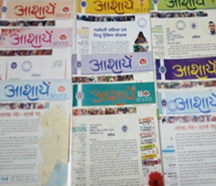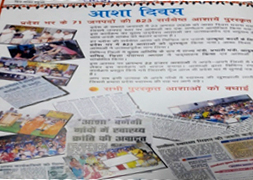Ashayein- Reinforcing Learning, Expanding Horizons
A journal for capacity building of the Accredited Social Health Activist in UP
The cornerstone of the National Health Mission's master plan, ASHA-the Accredited Social Health Activist, is the first point of contact that a community has with the health system. In an attempt to make maximum use of the ASHA in strengthening the comprehensive primary healthcare, SIFPSA, in coordination with NHM, introduced the ASHA Newsletter titled 'Ashayein' for continuous capacity building of the frontline workers.
 Without frontline health workers, there would be no health care for millions of women and their families in the developing world. The frontline health workers are the backbone of any effective health system. Based in the community and most often coming from the community they serve, they play a critical role in providing a local context for proven health solutions, connecting families and communities to the health system. Through door to door inter personal counseling and community outreach, they promote better health seeking behaviors amongst the community they serve, including the remote rural areas and urban poverty clusters and slums.
Without frontline health workers, there would be no health care for millions of women and their families in the developing world. The frontline health workers are the backbone of any effective health system. Based in the community and most often coming from the community they serve, they play a critical role in providing a local context for proven health solutions, connecting families and communities to the health system. Through door to door inter personal counseling and community outreach, they promote better health seeking behaviors amongst the community they serve, including the remote rural areas and urban poverty clusters and slums.
However, the comprehensive revamping of health care service delivery system under the National Health Mission (NHM) must be viewed in the context of the global efforts to revitalize the 'health for all' agenda and promote Universal Health Coverage (UHC). UHC as a concept involves equity in the access to health care, reducing vulnerability of communities to ill health through community empowerment, attempting to address the social determinants of health.
A cornerstone of the reforms was the introduction of a cadre of women health volunteers from community called Accredited Social Health Activists (ASHA). The ASHA represents the latest in a long series of approaches by the government to incorporate community level frontline health workers. Trained and supported to function in her village to improve the health status of the community, the ASHAs ensure securing people's access to health care services through improved health care practices and behavior. They help in creating awareness on health issues, mobilize community towards local health planning and increase utilization and accountability of the existing health service delivery system.
Uttar Pradesh has over 150,000 Accredited Social Health Activists (ASHAs), an enormous front line field force that has the potential to catapult the reach and utilization of Reproductive, Maternal, Newborn, Child and Adolescent Health (RMNCH+A) services in the state. Each ASHA is assigned about 1000 population in the rural areas with the purpose of supporting the community to access public health services. For the first time, urban ASHAs are being identified and inducted to play a similar role in urban slums and poverty clusters in Uttar Pradesh. The ASHA is expected to create awareness on health and its determinants, mobilize the community towards local health planning, and increase utilization of the existing health services.
Building capacity of the ASHAs is critical in enhancing their effectiveness in the community. Capacity building of the ASHA is being seen as a continuous process. An ASHA, at the time of induction, undergoes series of training episodes to acquire the necessary knowledge, skills and confidence for performing her spelled out roles. The training, it is envisaged, will help in equipping them with necessary knowledge and skills resulting in achievement of NHM objectives.
To complement the classroom based training and capacity building, NHM, UP with support from SIFPSA introduced a quarterly newsletter called 'Ashayein' with a vision to provide a medium to regularly update the ASHAs with information and knowledge about their work, skills required in problem solving, at the same time motivating them through recognition of best practices from the field. The newsletter also has a section dedicated to publishing the ASHAs'letters and replying to their queries.
Some of the regular sections of the newletter 'Ashayein' include: aapki rachnayein (encouraging creativity), aapke patron ke jawab (letters from ASHAs), samachaar (news brief), upyogi jankari(useful tips and information ), Rashtriya Karyakram (highlights of National Programs), Nayi Yojnayein (new schemes), Sehat ki Rasoi (health recipes), Asha ki kahani ASHA ki Zubani (their stories of success) and Puraskrit ASHA ki kahaniyan (testimonials of award winning ASHAs).
 Issues of the quarterly newsletter 'Aashayein' published and circulated widely amongst the ASHAs in the past, proved to be a very useful medium for updating knowledge of ASHAs, resulting in making their interaction with the community more fruitful, as revealed by an impact assessment carried out by SIFPSA. The ASHAs invariably carried the newsletter to the field, using it as a ready-reckoner. The newsletter was quoted as being a 'constant companion' by ASHAs, updating their knowledge and strengthening their counselling efforts during home visits, empowering them to manage their work more effectively.
Issues of the quarterly newsletter 'Aashayein' published and circulated widely amongst the ASHAs in the past, proved to be a very useful medium for updating knowledge of ASHAs, resulting in making their interaction with the community more fruitful, as revealed by an impact assessment carried out by SIFPSA. The ASHAs invariably carried the newsletter to the field, using it as a ready-reckoner. The newsletter was quoted as being a 'constant companion' by ASHAs, updating their knowledge and strengthening their counselling efforts during home visits, empowering them to manage their work more effectively.
'Aashayein' provided experiential learning, offered customized solutions by sharing evidence based best practices, also providing a platform to recognize good performance amongst this cadre. Looking at the overwhelming response, another edition of the newsletter was recently released by SIFPSA and distributed among the ASHAs during the ASHA Sammelan.
'Aashayein', a dedicated newsletter for ASHAs is a unique attempt by SIFPSA and NHM UP. It is a powerful medium to reach out to ASHAs, get their voices heard, recognize and celebrate their good work, reinforcing learning and expanding their horizons.
Best Practices / Ongoing Activities
- Health Partners' Forum - Fostering convergence, maximizing synergies
- Strengthening Implementation of RMNCH+A Health Strategies in UP
- Forging Partnerships for Augmenting Family Planning Performance in UP
- Garnering Support-Reinforcing Commitments: Working with the Village Health Sanitation and Nutrition Committee
- Moving towards excellence: Capacitating ASHA Sanginis for supportive supervision and performance improvement
- Folk Media - Health Messages through Edutainment"Chalo Gaon Ki Oar"
- Newsletter ASHAYEIN
- Lok Geeton Mei Beti English Hindi
- Chalo Gaon Ki Oar English Hindi
- HMIS & MCTS Training cum Review English Hindi
- Clinical Family Planning activities
- Hausala Sajheedari English Hindi
- mSehat English Hindi
- Sampoorna English Hindi
- Sehat Sandeshwahini English Hindi
- Sarthi Sandeshwahini English
- Sunehere Sapne Sanwarti Rahein
- Hausala Training Centres
- World Population Day English Hindi
- Barriers to Family Planning Use in Rural Uttar Pradesh English Hindi
- Out of Pocket Expenditure and Health Seeking Behaviour in Uttar Pradesh English Hindi
- Meri Sehat Mera Nirnay
- ASHA will be the first port of call for any health related demands of deprived sections of the population, especially women and children, who find it difficult to access health services.
- ASHA will be a health activist in the community who will create awareness on health and its social determinants and mobilize the community towards local health planning and increased utilization and accountability of the existing health services.
- She would be a promoter of good health practices and will also provide a minimum package of curative care as appropriate and feasible for that level and make timely referrals
- ASHA will provide information to the community on determinants of health such as nutrition, basic sanitation & hygienic practices, healthy living and working conditions, information on existing health services and the need for timely utilization of health & family welfare services.
- She will counsel women on birth preparedness, importance of safe delivery, breast-feeding and complementary feeding, immunization, care of the young child, contraception and prevention of common infections including Reproductive Tract Infection/Sexually Transmitted Infections (RTIs/STIs).
- ASHA will mobilize the community and facilitate them in accessing health and health related services available at the Anganwadi/sub-centre/primary health centers, such as immunization, Ante Natal Check-up (ANC), Post Natal Check-up supplementary nutrition, sanitation and other services being provided by the government.
- She will act as a depot holder for essential provisions being made available to all habitations like Oral Rehydration Solution (ORS), Iron Folic Acid Tablets(IFA), chloroquine, Disposable Delivery Kits (DDK), Oral Pills & Condoms, etc.
- At the village level it is recognized that ASHA cannot function without adequate institutional support. Women's committees (like self-help groups or women's health committees), village Health & Sanitation Committee of the Gram Panchayat, peripheral health workers especially ANMs and Anganwadi workers, and the trainers of ASHA and in-service periodic training would be a major source of support to ASHA.
Get in Touch with us
(Uttar Pradesh), INDIA
E-Mail : info@sifpsa.org
Phone :(91 - 0522) 2630902,997,741,896,899,894
Fax :
Site Manage by : MARG Software Solutions
2016 © SIFPSA All Rights Reserved
Number of Visitors

